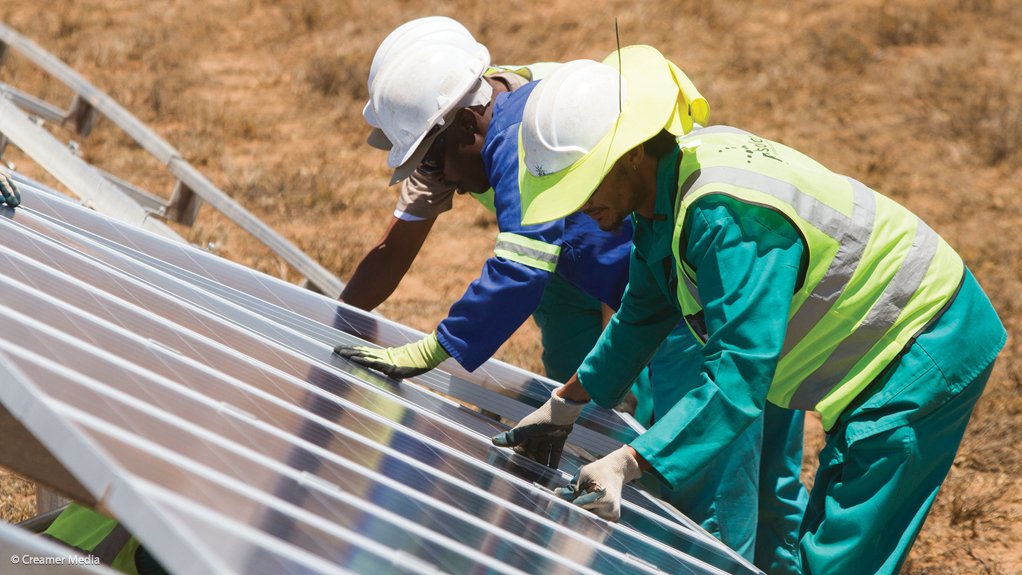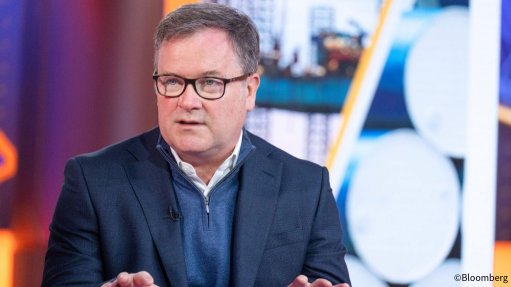DMRE outlines timetable for electricity procurement programmes


Workers installing solar panels at a project in South Africa
Photo by Creamer Media
The Department of Mineral Resources and Energy (DMRE) has provided an updated timetable for the implementation of its long-term electricity procurement programmes, which are being pursued in line with a Section 34 Ministerial determination, published in September 2020, and catering for the procurement of more than 11 800 MW of new generation and energy storage capacity.
Following a seven-year interruption, the Renewable Energy Independent Power Producer Procurement Programme (REIPPPP) resumed in April with the release of a request for proposals (RFP) for bid window five (BW5), through which government is seeking to procure 2 600 MW of new solar photovoltaic (PV) and wind capacity.
Following the bid-submission closing date of August 16, the DMRE confirmed that it had received 63 solar PV bids and 39 onshore wind bids, suggesting significant over-subscription albeit that the department did not release the capacity associated with each project.
In a briefing to the Portfolio Committee on Mineral Resources and Energy on Tuesday, DMRE head of strategy Lucas Mulaudzi said that projects selected as part of BW 5 were expected to enter into commercial operation from March 2023 onwards.
He also shared an indicative implementation timetable for the other technologies incorporated into the Ministerial determination, which includes the following procurement allocations over a three-year horizon: 4 800 MW of wind, 2 000 MW of solar PV, 1 500 MW of new coal and 3 000 MW of gas, as well as 513 MW of battery energy storage capacity.
The determination is aligned with the Integrated Resource Plan of 2019, which envisages the procurement of more than 31 300 MW of new generation and storage capacity between 2020 and 2030, during which some 11 000 MW of coal is also scheduled for decommissioning.
The timetable includes a target date of September 28 for the launch of REIPPPP BW6, along with an indicative bid-submission date of February 1, 2022, and target dates of May 5 and September 19, 2022, for the naming of preferred bidders and financial close respectively.
The RFP for BW7 has been pencilled in for February 15 next year, with a target bid-submission date of June 21, 2022, followed by the announcement of preferred bidders on September 30 and financial close on February 16, 2023.
The BW7 process would be preceded, on November 22 this year, by an RFP for energy storage, which had a target bid-submission date in the table of February 25, 2022, with the dates for the preferred bidder announcement and financial close indicated as being May 4 and September 5, 2022, respectively.
A target date of February 28, 2022, has been set for the launch of a gas-to-power RFP, with September 2 and December 2 next year highlighted as the dates for bid submission and the naming of preferred bidders, followed by financial close on July 7, 2023.
The table still includes the launch of a coal RFP on March 31, 2022, but DMRE deputy director-general Jacob Mbele reported that the department was undertaking a “market scan” to assess prospects for such projects, in light of the fact that funders were withdrawing from coal globally.
Should the RFP proceed, however, bid submissions would need to be in by December 4, 2022, with an intention of naming preferred bidders on March 31, 2023, and with financial close to follow on April 6, 2024.
Mineral Resources and Energy Minister Gwede Mantashe, who participated in the virtual Portfolio Committee meeting, made his now typical defence of coal, lamenting that South Africa had become “allergic to coal and fossil fuels” without having regard to its developmental context.
“You know we are a strange country that is so keen to commit economic suicide – I have never seen any other country doing that.
“China as we sit here today is building 15 coal power stations, a few countries in Europe are beginning to resuscitate coal power stations, because they talk to the realities of their development.
“We are not talking to the reality of our development, we are allergic to coal and fossil fuels, without talking about what are our developmental needs,” Mantashe said, while proceeding to question why Eskom wanted to introduce renewable energy at Komati instead of converting the station from coal to gas.
PROCUREMENT RISKS
Meanwhile, Mulaudzi also reported that the procurement programmes, including the REIPPPP and the Risk Mitigation Independent Power Producer Procurement Programme (RMIPPPP), continued to face “risks and challenges”.
The main risk identified for REIPPPP BW5 was one associated with meeting the local-content thresholds for PV panels.
The DMRE acknowledged that there was insufficient local capacity and that locally assembled panels were more expensive.
In response to questioning from members of the committee on the issue, Mbele said the DMRE hoped to resolve the matter through the finalisation – together with the Department of Trade, Industry and Competition, as well as business and labour – of the South African Renewable Energy Masterplan (SAREM), which would offer investors the certainty they required to invest in local renewables component manufacturing.
Mbele said the SAREM should be finalised by the end of the current fiscal year.
The solar-linked projects procured as part of the RMIPPPP were granted a partial exemption from sourcing 35% of the solar PV panels required for their projects from local suppliers.
However, the initial eight preferred bidders, named on March 18, had also been given an extension to September 30 to reach financial close, a date that coincided with the financial-close deadline for the three additional preferred bidders selected on June 1.
The original financial close deadline for the initial eight projects had been set as July 31.
Mulaudzi said the delay was based on a lack of readiness by government and Eskom rather than the bidders.
He acknowledged, however, that a legal challenge against the three Karpowership SA projects, which comprise 1 200 MW of the nearly 2 000-MW programme, posed a risk to the RMIPPPP.
The legal case, which had been brought by DNG Energy, was scheduled to be heard from September 9 to 13 and Mulaudzi said that the ruling was expected in the same week.
However, Karpowership SA, and others, were also currently appealing the refusal of the Department of Forestry, Fisheries and the Environment to grant environmental authorisation for the projects, while several objections to the licensing of the projects were raised during recent National Energy Regulator of South Africa hearings.
Mbele said that should the projects fail to proceed it was unlikely that South Africa would be able to secure similar dispatchable capacity that could be connected to the grid by August 2022.
In response to Eskom’s reported reticence to buy electricity from the Karpowership SA projects Mantashe said: “If Eskom doesn’t want energy from power ships, but it takes energy from other fossil fuels, then again we will have to interrogate that issue. [But] not now, we need to allow the court case [to conclude].”
Comments
Press Office
Announcements
What's On
Subscribe to improve your user experience...
Option 1 (equivalent of R125 a month):
Receive a weekly copy of Creamer Media's Engineering News & Mining Weekly magazine
(print copy for those in South Africa and e-magazine for those outside of South Africa)
Receive daily email newsletters
Access to full search results
Access archive of magazine back copies
Access to Projects in Progress
Access to ONE Research Report of your choice in PDF format
Option 2 (equivalent of R375 a month):
All benefits from Option 1
PLUS
Access to Creamer Media's Research Channel Africa for ALL Research Reports, in PDF format, on various industrial and mining sectors
including Electricity; Water; Energy Transition; Hydrogen; Roads, Rail and Ports; Coal; Gold; Platinum; Battery Metals; etc.
Already a subscriber?
Forgotten your password?
Receive weekly copy of Creamer Media's Engineering News & Mining Weekly magazine (print copy for those in South Africa and e-magazine for those outside of South Africa)
➕
Recieve daily email newsletters
➕
Access to full search results
➕
Access archive of magazine back copies
➕
Access to Projects in Progress
➕
Access to ONE Research Report of your choice in PDF format
RESEARCH CHANNEL AFRICA
R4500 (equivalent of R375 a month)
SUBSCRIBEAll benefits from Option 1
➕
Access to Creamer Media's Research Channel Africa for ALL Research Reports on various industrial and mining sectors, in PDF format, including on:
Electricity
➕
Water
➕
Energy Transition
➕
Hydrogen
➕
Roads, Rail and Ports
➕
Coal
➕
Gold
➕
Platinum
➕
Battery Metals
➕
etc.
Receive all benefits from Option 1 or Option 2 delivered to numerous people at your company
➕
Multiple User names and Passwords for simultaneous log-ins
➕
Intranet integration access to all in your organisation


















